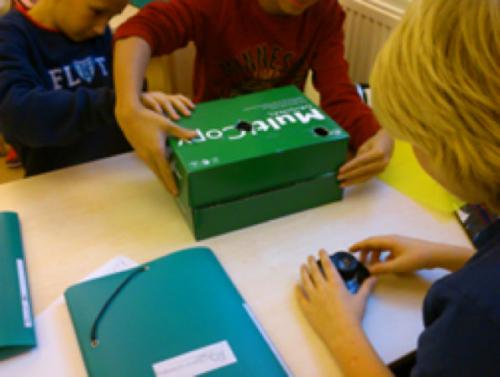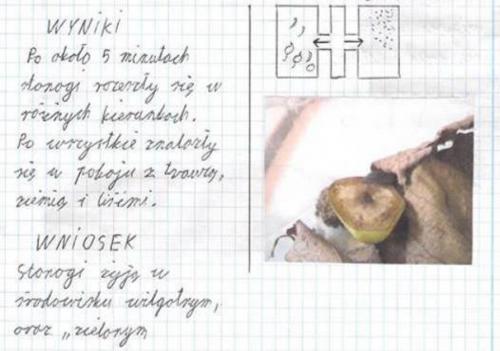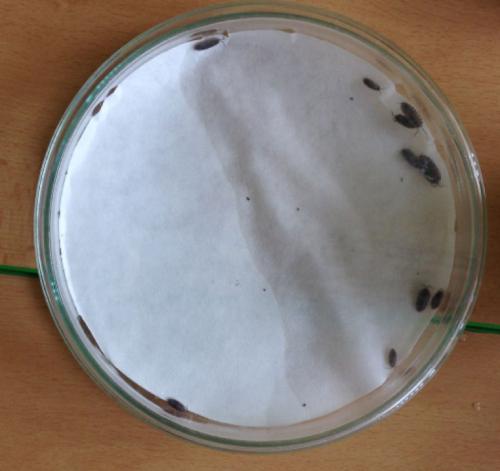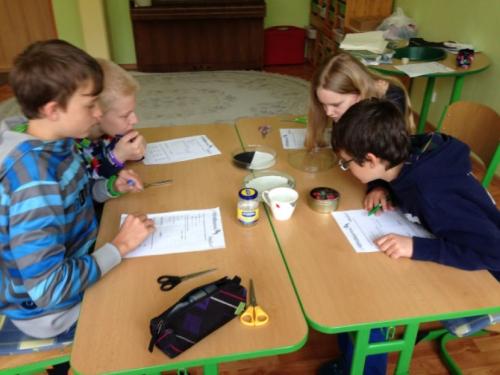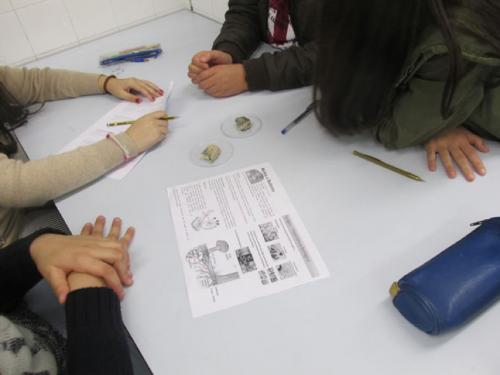The Woodlice SAILS inquiry and assessment unit outlines an activity that is intended to aid students in learning about the environment, ecology, and animal behaviour. Students investigate the living conditions of woodlice, which are common in large parts of Europe and are easy to handle. Other small animals with similar habitats may also be used. The expected learning outcomes are: (1) learn to plan, perform and evaluate an experimental study, and (2) identify and explain ecological relationships using scientific concepts, models, and theories. These learning outcomes are part of the science curriculum at lower second level across Europe.
Skills emphasised for development and assessment include developing hypotheses and planning investigations (designing and conducting an experiment). Throughout the activities students will have opportunities to practice a range of other inquiry skills, such as collecting and interpreting data (planning investigations), drawing appropriate conclusions (forming coherent arguments), and reporting and discussing results (scientific reasoning). Suggested assessment tools are provided in the unit, but it is the teachers' choice to select what inquiry skills to develop and assess. This unit can be implemented over two lessons (45 minutes each).
The unit was trialled in Sweden, Poland, Ireland, Slovakia and Portugal, with students aged 12-16 years (8 classes in total, mixed ability and gender). Teaching approaches varied, for example in Ireland the teacher formed a guided inquiry, while in Poland the students engaged in open inquiry. In all case studies developing hypotheses was assessed, while assessment of other skills varied between case studies.
- Introduction to working with living animals
- Living conditions
- Animal behaviour
- Lower
- Planning investigations
- Developing hypotheses
- Forming coherent arguments
- Working collaboratively
- Scientific reasoning
- Scientific literacy
- Classroom dialogue
- Teacher observation
- Self-assessment
- Worksheets
- Student devised materials
- Presentations
- Other assessment items
The Woodlice SAILS unit was developed by the team at Malmö University as a part of the SAILS project. This is proposed as an open inquiry activity, in which students are asked to investigate the living conditions of woodlice, which are common across Europe and easy to handle. This activity aids students in learning about the environment, ecology, and animal behaviour. The biology content in this unit is connected to carrying out investigations using living animals. Both ethical and practical issues can be considered. The expected learning outcomes are: (1) learn to plan, perform and evaluate an experimental study, and (2) identify and explain ecological relationships using scientific concepts, models, and theories.
This unit is particularly suitable for assessing developing hypotheses, planning investigations (planning and designing scientific experiments; drawing conclusions; explaining unexpected results; reporting, comparing, and discussing results, and providing suggestions about how to improve investigations. Three-level rubrics are proposed for assessing investigative skills – asking inquiry questions, developing hypotheses, planning investigations, carrying out an investigation, interpreting results and drawing conclusions, evaluating an investigation, documenting and discussing, observations and classification.
Below you can find the full inquiry and assessment unit for download, as well as an archive with classroom materials, including student worksheets and assessment tools for teachers to be used during the activities if available.
Unit booklet Classroom materials| Concept focus |
Investigating the living conditions of woodlice
|
| Inquiry skills focus |
Planning investigations
Developing hypotheses
Forming coherent arguments
Working collaboratively
|
| Scientific reasoning |
Recording data and observations
Drawing conclusions
|
| Scientific literacy |
Data analysis and presentation of results
Critiquing experimental design
|
| Assessment methods |
Classroom dialogue
Teacher observation
Worksheets
Student devised materials
Presentations
|
This unit was trialled in five countries, producing five case studies of its implementation – CS1 Sweden, CS2 Poland, CS3 Ireland, CS4 Slovakia and CS5 Portugal. The ages of the students involved were 12-16 years. Generally, the case studies describe 2-3 lesson periods of approximately 45 minutes. The most common method of implementation was to work in pairs or small groups, mixed with class discussions. A written report from the students was the most common student artefact to assess, even if performance-based assessment was possible.
This unit was developed as an open inquiry activity and allowed variation in its implementation depending on the class group. In CS1 Sweden, unit was implemented as a bounded inquiry. Students discussed in groups, and the teacher collected questions. After discussions there was an evaluation from the teacher. The students decided on questions to investigate and engaged in a follow up discussion at the end. CS4 Slovakia also used a bounded inquiry approach, in which students started by raising questions, before carrying out their investigation in small groups.
In CS2 Poland the unit was implemented as an entirely open inquiry. In the first lesson they discussed planning their investigations. Students selected investigation to study. Students planned, carried out and analysed results of the experiments entirely on their own, i.e. which animals, factors to investigate, how to collect evidence. Little direction was given by the teacher.
In both CS3 Ireland and CS5 Portugal, the teachers chose to use a guided inquiry approach. In CS3 Ireland, the students first engaged in an open discussion, then the teacher picked three options for students to investigate. In CS5 Portugal, a theoretical framework for the inquiry was established using images of ecosystems and an interactive discussion.
Within the five case studies, the inquiry skills of planning investigations and developing hypotheses were chosen for assessment in most cases. Teachers also assessed students’ skills in forming coherent arguments and working collaboratively and opportunities to develop and evaluate scientific reasoning and scientific literacy were identified. Assessment methods include teacher observation and classroom dialogue, as well as self-assessment of working collaboratively in CS5 Portugal and a post-implementation test in CS2 Poland. Student artefacts, such as worksheets, presentations or other student devised materials were evaluated in most case studies. The teachers used the rubrics provided in the original unit, with some modifications.
Below you can find the full inquiry and assessment unit for download (excluding the case studies), as well as an archive containing all the case studies.
Unit booklet Case studies| Concept focus |
Investigating the living conditions of woodlice
|
| Activities implemented |
Woodlice
|
| Inquiry skills assessed |
Planning investigations
Developing hypotheses
|
| Scientific reasoning |
Recording data and observations
|
| Scientific literacy |
Critiquing experimental design
|
| Assessment methods |
Classroom dialogue
Teacher observation
Student devised materials
|
| Level |
Lower
|
| Age |
13
|
| Prior experience with inquiry |
No experience
|
| Concept focus |
Investigating the living conditions of woodlice (or other insects)
|
| Activities implemented |
Woodlice
|
| Inquiry skills assessed |
Planning investigations
Developing hypotheses
Forming coherent arguments
|
| Scientific reasoning |
Data entry
Drawing conclusions
|
| Scientific literacy |
Data analysis and presentation of results
|
| Assessment methods |
Classroom dialogue
Teacher observation
Student devised materials
Other assessment items
|
| Level |
Lower
|
| Age |
13
|
| Prior experience with inquiry |
No experience
|
| Concept focus |
Investigating the living conditions of woodlice
|
| Activities implemented |
Woodlice
|
| Inquiry skills assessed |
Planning investigations
Developing hypotheses
|
| Assessment methods |
Classroom dialogue
Teacher observation
Self-assessment
Presentations
|
| Level |
Upper
|
| Age |
15-16
|
| Prior experience with inquiry |
Some experience
|
| Concept focus |
Investigating the living conditions of woodlice
|
| Activities implemented |
Woodlice
|
| Inquiry skills assessed |
Planning investigations
Developing hypotheses
Working collaboratively
|
| Assessment methods |
Classroom dialogue
Teacher observation
Presentations
|
| Level |
Lower
|
| Prior experience with inquiry |
Some experience
|
| Concept focus |
Investigating the living conditions of snails, woodlice and a fungus
|
| Activities implemented |
Woodlice
|
| Inquiry skills assessed |
Developing hypotheses
Working collaboratively
|
| Assessment methods |
Classroom dialogue
Teacher observation
Self-assessment
Worksheets
|
| Level |
Lower
|
| Age |
13-14
|
| Prior experience with inquiry |
No experience
|

